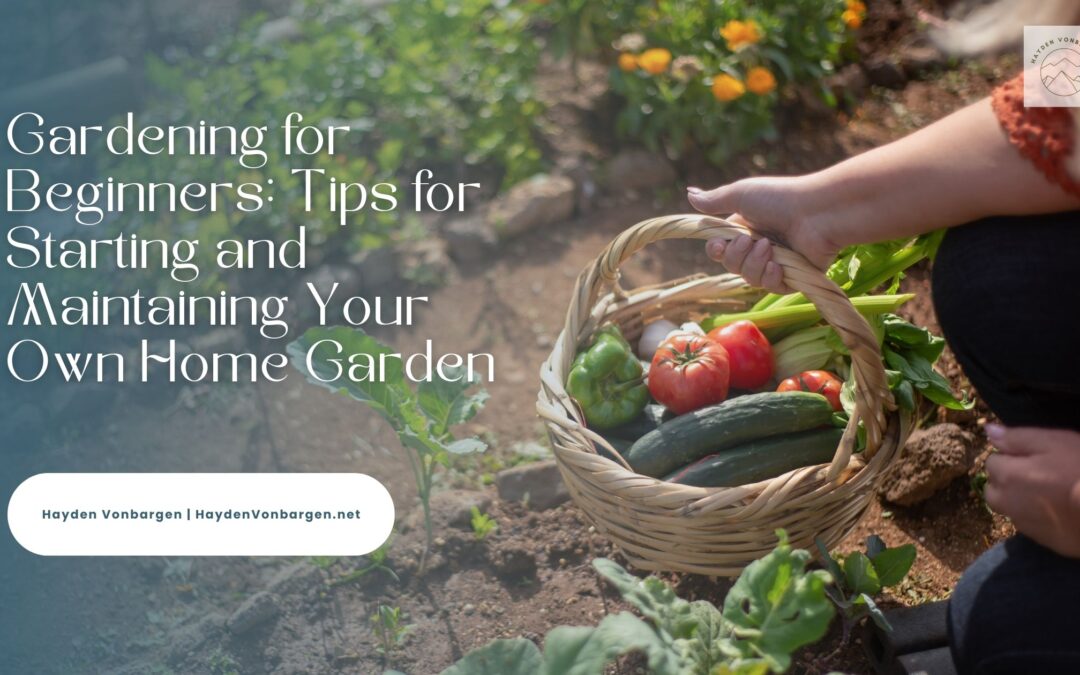Gardening is a timeless and rewarding hobby that offers many benefits, from beautifying your surroundings to providing fresh produce for your table. If you’re a beginner eager to dip your toes into gardening, you’re in for a treat. This blog will guide you through the essential steps of starting and maintaining your home garden.
1. Choose the Right Location
Selecting the right location for your garden is paramount to its success. Most plants require ample sunlight to thrive, so choose a spot that receives at least 6-8 hours of direct sunlight daily. Additionally, ensure that the area has good drainage to prevent waterlogging. If you’re tight on space, consider container or vertical gardening to maximize your available area.
2. Decide on Garden Design and Layout
Before you start planting, envision the design and layout of your garden. Decide whether you want a vegetable garden, a flower garden, or a mix of both. Plan the arrangement of plants based on their size and growth habits, ensuring that taller plants do not shade out smaller ones. This step will help you make the most of your garden space and create an aesthetically pleasing arrangement.
3. Choose the Right Plants
As a beginner, opt for relatively easy plants to grow and maintain. Some excellent choices for beginners include tomatoes, lettuce, zucchini, marigolds, and pansies. These plants are hardy and forgiving, making them ideal for those just starting out. Be sure to consider your climate and growing zone when selecting plants to ensure they are well-suited to your area.
4. Prepare the Soil
Healthy soil is the foundation of a successful garden. Test your soil’s pH and nutrient levels, and amend it accordingly. Most plants prefer slightly acidic to neutral soil. Adding compost or well-rotted manure can improve soil structure and fertility. Properly preparing the soil before planting will give your plants the nutrients they need to thrive.
5. Planting and Watering
Follow planting instructions for each type of plant, paying attention to spacing and depth. Watering is crucial, especially in the early stages of growth. Water your plants thoroughly after planting and maintain consistent moisture levels throughout their growth. Be cautious not to overwater, as this can lead to root rot. Consider using a soaker hose or drip irrigation system to water your garden efficiently.
6. Weed and Pest Management
Weeding is an ongoing task in any garden. Regularly remove weeds to prevent them from competing with your plants for nutrients and water. Additionally, keep an eye out for pests that may damage your plants. Introduce natural predators like ladybugs and lacewings to help control pests organically. Sometimes, you may need to use eco-friendly pesticides as a last resort.
7. Mulching
Mulching offers a range of benefits, including weed suppression, moisture retention, and temperature regulation. Apply a layer of organic mulch, such as straw or wood chips, around your plants to help conserve water and improve soil health. Mulching also gives your garden a neat and tidy appearance.
8. Regular Maintenance
Gardening requires consistent care and attention. Regularly inspect your plants for signs of disease, pests, or nutrient deficiencies. Prune dead or damaged growth to encourage healthy development. As your plants grow, consider providing support with stakes or trellises to prevent them from toppling over.
9. Learn and Adapt
Gardening is a learning experience, and you’ll inevitably encounter challenges. Don’t be discouraged by failures; use them as opportunities to learn and improve. Gardening forums, books, and local gardening clubs can be valuable resources for gaining knowledge and connecting with experienced gardeners.
Starting and maintaining a home garden can be a fulfilling journey that brings you closer to nature and gives you a sense of accomplishment. By following these beginner-friendly tips, you’ll be well on your way to creating a vibrant and thriving garden that you can enjoy for years. Remember that gardening is not just about the end result; it’s also about the joy of nurturing life and watching your efforts bloom into a beautiful and bountiful garden.

